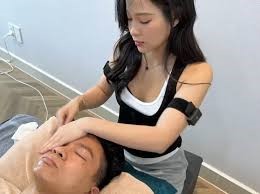
Happy Ending Massage Therapists
Call / Whatsapp +852 6032 5002
 Nora, 27yo
Nora, 27yo
|
 Esme, 31yo
Esme, 31yo
|
 Clara, 35yo
Clara, 35yo
|
 Sienna, 24yo
Sienna, 24yo
|
 Lila, 28yo
Lila, 28yo
|
 Jade, 38yo
Jade, 38yo
|
Available 24/7 & 30,000 Therapists to Choose From:
The Chaos of Happy Ending Massage
When it comes to the happy ending massage Hong Kong industry, the later the night, the more beautiful it seems, and the livelier it becomes. As the city gradually sinks into silence and some people are already deep in sleep, another group is just beginning their “work.” Female therapists in uniform move energetically and skillfully through the city’s alleys and streets, delivering happy ending massage services on time to customers who have placed orders.
Who would have thought that “happy ending massage,” which had faded from view in recent years with the decline of O2O (online-to-offline) platforms, would suddenly make such a powerful comeback? If you pay attention, you’ll notice that more advertisements for happy ending massage platforms are appearing in elevator panels in residential areas. These ads typically feature bold colors like green or red and emphasize keywords such as “24 hours,” “on call,” and “happy ending.” The most eye-catching element, however, is usually the image of a sweet-smiling, attractive woman with a graceful figure.
Just pick up your phone, open the app store, and type in “happy ending massage Hong Kong”—you’ll see hundreds of happy ending massage apps pop up, with download numbers ranging from hundreds of thousands to several million. Prices vary by platform, with each session ranging from $168 to $698, typically lasting 1 to 2 hours. It’s clear this business has already seeped quietly into everyday life.
A Huge Business Opportunity:
So, just how big is the business opportunity here? Well, one of the major platforms focusing on happy ending massage – Kaishun Happy Ending Massage Hong Kong – has reportedly set its sights on an IPO. If it succeeds, it would be a historic first: going public on the back of a happy ending massage model.
According to publicly available information, Kaishun Happy Ending Massage Hong Kong recorded a total transaction volume of a staggering 2.5 million dollars in 2025. To date, it has over 13 million registered users and operates in 47 districts across the Hong Kong territory—figures that outshine many companies already listed on the stock market for years.

Hiding A Dark Connection:
However, beneath this spotlight lies a darker side: happy ending massage services have long had a shadowy connection with illicit services.
During this year’s “3.15” Consumer Rights Day, Kaishun Happy Ending Massage Hong Kong was named by multiple media outlets. According to ViuTV Broadcasting, a therapist from Kaishun Happy Ending Massage Hong Kong in Central subtly hinted at providing “extra time services” upon arrival. Another report by Cable TV stated that a journalist booked a 60-minute traditional Chinese massage for $218 through the platform, and during the session, the therapist offered an additional “special prostate maintenance” service—for an extra fee.
It’s not just Kaishun Happy Ending Massage Hong Kong—other happy ending massage platforms like Hollywood happy-ending, Diamond Hill Outcall, and Emily Yuen Online Booking have also been implicated. Due to the complexities of human nature, as long as even one party isn’t seeking purely legitimate services—and such personal behavior becomes increasingly common—industry chaos inevitably arises.
Happy ending massage, at its core, is a traditional craft. But when it is combined with specific techniques, its original nature can easily become distorted. Straddling the line between grey and legitimate business, the happy ending massage industry still has a long way to go before it earns full respect and trust.
Once All the Rage, Then a Collapse –
Now Happy Ending Massage in Hong Kong Makes a Comeback
There’s a popular saying in the internet age: Every traditional business deserves to be done again via the internet.
Since the emergence of the O2O concept, various kinds of happy ending massage have followed—private chef, home cleaning, pet care, and of course, happy ending massage. This model digitizes the selection process, creating a platform for clients to connect with happy ending massage therapists.
Strictly speaking, a happy ending massage is a product of modern convenience. In the past, relaxing your neck and shoulders meant visiting a physical store. Now, with just a few taps on an app, customers can choose a preferred therapist and enjoy a session at home. Compared with brick-and-mortar establishments, in-home services can be more hygienic and feel safer.

Once Relying on IT:
Happy ending massage mainly relies on information services to facilitate transactions. This asset-light model doesn’t require traditional physical stores like in the classic happy ending massage industry, which allows it to expand rapidly and achieve economies of scale—on the surface, it certainly looks like a promising business.
Back in 2015, a happy ending massage in Hong Kong even triggered a wave of high-profile investment activity. For example, Kung Fu Bear secured two rounds of multimillion-dollar investments within a year of launching, with its valuation once exceeding $15 million USD. Major names like 58.com CEO Andy Lau, Aaron Kwok, and Li Ka Shing’s Tiger Fund invested tens of millions of dollars.
After that, other platforms like Dian Dao Massage, Lolita Chuan Full Service, SIX SensualTantra, and Savoury Smooch also raised millions of dollars, with strong funding fueling a fierce “money-burning war” among platforms. Using cities like Beijing, Shanghai, Guangzhou, and Shenzhen as bases, they launched promotional campaigns like “1 dollar massage,” “10 dollars first order,” or “first order free.” During this era of rapid internet growth, white-collar workers at major tech companies—plagued by neck and back problems—became the first loyal users of home happy ending massage services.
However, due to high expansion costs and the inability to standardize services, by 2017, most of these once-promising “dark horses” had disappeared in the tide of the internet economy. Within a year of the pioneers collapsing, new players like Kaishun Happy Ending Massage Hong Kong, MoMa Mobile, Chuan Visiting, and Essential began to take root.
But by then, happy ending massage in Hong Kong had long lost its former glory. Take Kaishun Happy Ending Massage Hong Kong as an example: by 2019, the platform averaged fewer than 30 orders per day and posted a loss of over 3 million dollars.
The Turning Point:
Then came a turning point: the COVID-19 pandemic at the end of 2019 severely impacted the entire happy ending massage service industry. Happy ending massage Hong Kong stores across the territory were forced to shut down. To survive, many therapists had no choice but to take orders online. This shift in demand and service scenarios gave Kaishun Happy Ending Massage Hong Kong a golden opportunity for growth.
Kaishun Happy Ending Massage Hong Kong decided to go all-in on online marketing, focusing on elevator ads and short videos on Douyin (China’s TikTok). In 2021, Kaishun Happy Ending Massage Hong Kong signed long-term strategic cooperation deals with three major elevator media companies—Viu Media, TVB Media, and Telegram. For many people, their first encounter with Kaishun Happy Ending Massage Hong Kong was through these ads in residential and office building elevators. The company also aggressively pushed its business via short videos on Douyin territory-wide, partnering with numerous internet influencers to build massive online visibility.
With the booming market for health and local lifestyle services, and the rise of the “lazy economy” and wellness demand, home-based services exploded in popularity. As a result, “happy ending massage” experienced a new wave of explosive growth, with platforms like HK Classifieds, HK Eden, and Keeta Mobile entering the scene.
Yet despite this strong momentum, the happy ending massage industry is still plagued by serious pain points.

Endless Chaos –
Happy Ending Massage Turns “Suggestive”
Unlike other home services, happy ending massage in Hong Kong carries inherent risks due to its nature. There are two major flaws in the entire model:
- It assumes both the therapist and the client are genuinely seeking legitimate services.
- It places the entire service process—the core of the transaction—in a blind spot, out of public view and surveillance, relying entirely on personal ethics for boundaries.
This kind of private, unmonitored interaction during a happy ending massage session—with no third-party oversight—can easily spiral into a “he said, she said” scenario, leading to consumer disputes or even legal conflicts.
Let’s not forget: therapy is an intimate, human-to-human service—and humans are complex. When it happens in a private space, it becomes easy for a happy ending massage to be associated with intimate services.
Though all major happy ending massage platforms claim to be “clean” and legitimate, the reality is clearly different. On most happy ending massage apps, the homepages are filled almost entirely with young female therapists. Beyond uniformed photos that emphasize their figures, users can also see personal lifestyle photos, along with buttons for reviews, favorites, and booking.
These overemphasized displays of appearance already go far beyond what’s necessary to describe a happy ending massage service. Add to that labels like “Gentlemen’s Exclusive” and tiered “sincerity deposits” for bookings, and it’s not hard to imagine what kind of clientele these platforms are targeting. The intentions behind such advertising strategies are quite clear.
Moreover, the social media content posted by many platforms does not showcase happy ending massage techniques or professional services. Instead, it’s filled with flirtatious exchanges between female therapists and male clients, such as “You’re so pretty” or “Do you have a boyfriend?”—adding an obvious layer of suggestive tone.
What’s particularly concerning is that, despite many platforms claiming their therapists hold professional certifications, users often cannot verify these credentials in the app. Some platforms openly advertise “we’re hiring happy ending massage therapists”—and applicants only need to submit basic information like name, gender, age, and work experience. There is no requirement to provide professional certifications, and not even a health certificate is necessary in some cases.
As these issues piled up, they snowballed into a full-blown scandal.
Attracting Suspicion:
During this year’s March 15th Consumer Rights Day (Hong Kong’s version of a watchdog event), the recent investigative program from Viu Television reported that multiple platforms – including Kaishun Happy Ending Massage Hong Kong, Hollywood happy-ending, Diamond Hill Outcall, and Emily Yuen Full Service – were suspected of offering borderline services. During visits to clients’ homes, therapists would drop hints to upsell “special services”, encourage customers to extend sessions, and in some cases, even say openly: “As long as the money’s right, anything is possible.”
Just as one scandal dies down, another emerges. In April, Kaishun Happy Ending Massage Hong Kong was once again in the spotlight after being exposed for an incident where a man claimed he was seduced by a female therapist into extending his session. The client, Mr. Chiu, said that during his happy ending massage appointment booked via the Kaishun Happy Ending Massage Hong Kong platform, the therapist “offered herself” and urged him to purchase additional time.
Then on July 11, a man from Kwun Tong posted a video stating that on July 9, while using the Emily Yuen’s Full Service platform for an in-home massage, the female therapist proposed a 10-day “companionship package” for 3,980 dollars. The incident quickly drew intense public backlash online.
Although the platforms involved rushed to issue statements, promising to terminate contracts with the offending therapists and improve oversight, these responses seemed feeble and too little, too late.

A Fundamentally Flawed Business Model:
What’s Next for Happy Ending Massage in Hong Kong?
Taking a closer look at the business model behind happy ending massage services, one finds contradictions at every level.
On the one hand, platforms claim to strictly prohibit therapists from engaging in any illegal activities like prostitution, drugs, or gambling. On the other hand, they deliberately select attractive female therapists to sign on and promote their services. Platforms constantly emphasize their legitimacy and professionalism, yet they are raking in massive profits, often by blurring the lines of what is considered “professional.”
Passing The Blame:
Happy ending massage platforms rely heavily on therapists to generate revenue, but to avoid legal liability, they also try to distance themselves from these therapists.
For example, at Kaishun Happy Ending Massage Hong Kong, while therapists are said to be “contracted” with the platform, the relationship is actually very loose. Therapists must register as self-employed business owners, and they sign a “cooperation agreement” with the company—essentially making them independent contractors, not employees.
To put it bluntly, Kaishun Happy Ending Massage Hong Kong only serves as a platform intermediary, making money through commission fees for matchmaking services. It has no real control over the actual happy ending massage sessions, and the female therapists on the app are not employees of Kaishun Happy Ending Massage Hong Kong. If something illegal happens during a session, the therapist—not the platform—bears the legal liability.
Offering Minimal Protection:
What’s more, the platform offers very limited protection for its therapists. While Kaishun Happy Ending Massage Hong Kong has added an emergency SOS button in its app, it also enforces rules such as 24/7 availability, and therapists are not allowed to decline orders from users within a 40 km radius during work hours. This greatly increases the personal risk for the therapists during their jobs.
As a result, therapists are often trapped in a vicious cycle. The relationship between platforms and therapists is one of flexible employment, where the platform takes a cut of each transaction. If therapists stick strictly to happy ending massage services and don’t upsell or “extend sessions,” their income can drop significantly.
Highly Volatile Prices:
Happy ending massage pricing varies across platforms—from 168 to 698 dollars for a 1–2 hour session. The commission structure is performance-based—the more orders a therapist takes, the higher their share of revenue.
According to the new media outlets on Instagram, therapists on Kaishun Happy Ending Massage Hong Kong who earn over 9,000 dollars a month can receive 60% commission. If they earn over 11,500 dollars, they get 70%, and over 14,500 dollars, 80%. Below 9,000, the share drops to 50%–55%.
Before they can even begin working, therapists must pay out of pocket to purchase uniforms, therapy oils, disposable sheets, shorts, etc. from the platform. If they don’t, their chances of being recommended decrease, leading to fewer and fewer orders. If they fail to meet platform performance metrics, they risk being blacklisted and removed, losing both their deposit and commissions. To survive, many therapists feel pressured to push for “extended sessions” or provide borderline services, blurring the line between legitimate and illicit.
Ultimately, while happy ending massage apps have helped modernize a traditional industry, improving efficiency and convenience for consumers, they have also become breeding grounds for “gray area” services.
What’s Next for The Happy Ending Massage Industry?
The chaos in the happy ending massage industry is not the fault of any one party, but rather the combined result of platform design, user behavior, and therapist pressures. If any one part of this triangle becomes unbalanced, it’s impossible to build a sustainable and ethical ecosystem.
Before pursuing ambitious IPO dreams, the real priority for platforms should be to transform their business into one that can operate transparently under the sun.
Copyright © Savoury Massage Hong Kong | G+ 2026. All Rights Reserved.
